Photographs: Dipak Chakraborty Indrani Roy in Malda, West Bengal
The Malda Medical College and Hospital in West Bengal has become infamous for the unbelievable number of infant deaths there. Indrani Roy sets out to find out why.
The first in a three-part series.
Photographs: Dipak Chakraborty
In an interview to Rediff.com in 2009, acclaimed writer Mahasweta Devi had said, "Statistics say that of all the Indian states, our state leads in child mortality rate."
Politically, things have undergone a sea-change in West Bengal since then.
People have ousted the three-decade-old Left Front government and have brought into power the Trinamool Congress led by Mamata Banerjee.
But what about child mortality rate?
The situation has not improved, it seems.
The horror of infants' deaths that haunted the state government-run Malda Medical College and Hospital in 2011 recurred in November this year with about 30 infants dying in a week.
Unofficial sources give the information that is even more shocking: 500 children have died at the same hospital between September 2011 and February 2012.
The Trinamool-led state government, however, seems to be in a state of denial.
In fact, it patted itself on the back for a fall in the infant mortality rate -- by two deaths per 1,000 -- in the state.
"There has been a three per cent drop in the child mortality rate in the last eight months in the state when the new government took over," then minister of state for health Chandrima Bhattacharya had told the media in January.
Quoting data from the Union health ministry, she had added that West Bengal now ranked 15th in child mortality rate.
The opposition Left Front, however, insisted that the figures presented by the minister were those of 2010-11.
So who was right? Confused by the contradictory statements and to seek out the truth, we set out for Malda.
Questions that thronged our minds:
- Why are these deaths occurring in Bengal and not in states where child malnutrition is worse?
- Is the primary healthcare system at fault?
- Is it district specific? Or does this occur across the state?
- Is there a pattern to these deaths?
. . .
'God only knows how the hospital is run with so few people'
Image: A mother is seen with her child at the Malda HospitalPhotographs: Dipak Chakraborty
The day we visited the Malda Medical College and Hospital, the first thing that hit us was the strong stench of urine wafting from every nook and corner.
It was suffocating.
Just as we wondered how ailing adults, let alone sick children, could breathe in such unhygienic air, we were shocked to find a garbage dump adjacent to the hospital's male ward.
How can someone who is unwell get better here, we asked the person who seemed to be the in-charge of that ward.
The man, in his mid-thirties, looked rattled.
"Are you from the press?" he mumbled and then swiftly rolled his eyes around him to check if anyone was listening to him.
Quickly rubbing his sweaty hands on the sides of his crumpled uniform and ensuring that it was not carrying his name, he said, "How do you expect the hospital to be clean? Where are the sweepers?
"People are retiring every month, yet the government is not recruiting new people."
Asked if he was the ward master, he said on condition of anonymity, "I am one of the contractual staff that the government hires.
"We get Rs 80 a day, paid in vouchers."
Asked what happened to the regular employees, he said (almost inaudibly), "Didi, there are only three ward masters now in place of six. Two got transferred, one got retired.
"Another one is due to retire in February. God only knows how the hospital is run with so few people.
"There is an acute shortage of staff -- be it doctors, nurses, ward boys, group D employees."
Once in a while, the hospital gets some assistance from volunteers and without them the condition could have been even worse, the man informed.
. . .
More patients, fewer beds
Image: It's mostly a one-man show at the Malda HospitalPhotographs: Dipak Chakraborty
Last year, following a hue and cry over child deaths in Bengal, the health department officials had made promises that care would be taken to address the issue.
But things did not progress much at least as far as Malda Medical College and Hospital was concerned.
The hospital does have a Neonatal Care Unit and Sick Neonatal Unit, but their infrastructure is so poor that it can put to shame even the healthcare centre of the remotest villages.
There are 23 and 22 beds in those two units whereas the general paediatric department can accommodate about 44 patients only.
However, the daily number of patients is always over 100.
To add to the problem, there are only eight paediatricians available.
It is natural, therefore, that the ailing children fail to get timely attention.
. . .
'We are trying our best to improve the situation'
Image: Trinamool Congress MLA Krishnendu Narayan Chowdhury, the new chairperson of Malda Hospital's patient welfare committeePhotographs: Dipak Chakraborty
As it happens always, government officials denied charges of neglect and shortage of staff.
However, following an uproar in the media over the recent deaths, the new member of legislative assembly in Chief Minister Mamata Banerjee's Cabinet, Krishnendu Narayan Chowdhury, has replaced the Malda Hospital's patient welfare committee chairperson Sabitri Mitra.
Speaking to Rediff.com, Chowdhury said, "Most of the children who passed away were brought to the hospital in a very bad state.
"Some of them were shifted from hospitals located in other districts and the adjacent state of Jharkhand.
"Their condition deteriorates on the way and not much can be done once they arrive here.
"The doctors can only do their jobs. They cannot achieve the impossible," Chowdhury said.
"Also, most of the healthcare centres across the district are not capable enough to deal with medical emergency.
"But things are not as bad as the media portrays it to be.
"Apart from doing up this hospital, we are also working hard to improve the state of the primary healthcare centres as well," he added.
Asked about poor infrastructure of the Malda Hospital, Chowdhury said, "Our government is trying its best to improve the situation.
"We are keeping a strict vigil round the clock and working diligently", he added.
. . .
'Ministers only make tall promises that are seldom kept'
Image: Hospital authorities are callous and rude and have no sympathy for the patients, says Malda resident RafiqulPhotographs: Dipak Chakraborty
Chowdhury's statements were pooh-poohed by Mohammad Rafiqul, a resident of Malda's Milki area.
Having recently lost his three-month old nephew, Rafiqul said, "Doctors and nurses here don't want to work.
"They are callous and rude and have no sympathy for the patients.
"A few days back, my nephew had been admitted here with seasonal cold and breathlessness, illnesses that are hardly fatal.
"But we had to wait for hours before he could be attended to.
"And when the first injection was pushed into him, it was too late."
On hearing that Krishnendu Narayan Chowdhury has promised to improve the state of healthcare centres at the block-level, Rafiqul smiled wrily before adding, "We have been hearing this for years.
"Ministers are very smart. They make tall promises but seldom keep them."
Rafiqul had another alarming story to tell.
Once, when his uncle got caught in a local skirmish, a part of his right palm was chopped off by a goon.
According to him, when he brought his uncle to this hospital for treatment, he kept writhing in pain for six hours before he was taken to the operation theatre.
"Is this what Mr Chowdhury means by improved healthcare system" Rafiqul asked.
...
'We have the infrastructure but there is room for improvement'
Image: Malda Medical College and Hospital principal Ucchalkumar BhadraPhotographs: Courtesy: Malda Medical College website
When we contacted Malda Medical College and Hospital principal Ucchalkumar Bhadra, the latter denied the charges made by Rafiqul.
In a telephonic interview, he also refused to accept that this year's infants' deaths were part of an epidemic.
Asked if the hospital infrastructure was in a shambles as claimed by the patients and their family members, he was clearly irked.
"In winter, infants' deaths occur everywhere across the world".
"Even countries like USA and Canada, places where India Abroad (a newspaper owned by Rediff.com) is available, are not spared.
"The media is unnecessarily making an issue out of a non-issue," he said.
"Infants and children who died here were brought in an extremely critical condition. They were malnourished and most had septicemia," Bhadra said.
Asked about the poor state of hygiene in the hospital, he said, "Why don't you come over? I will take you for a walk around the campus and you can check for yourself."
Strangely, when we took up his offer, he said he was overly busy and would not be 'available' to speak to the media.
(To be continued)

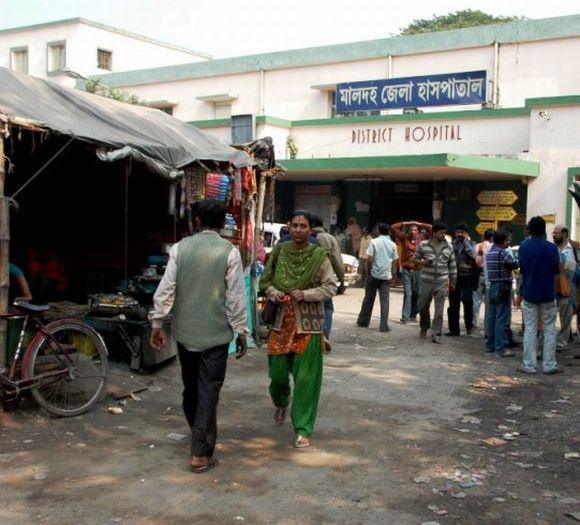
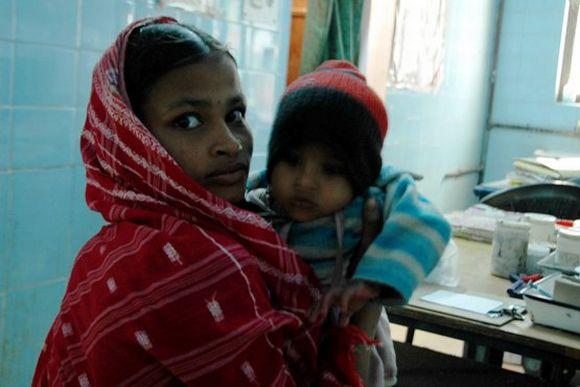
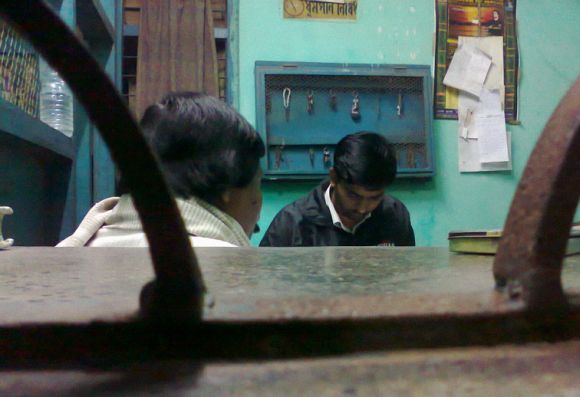
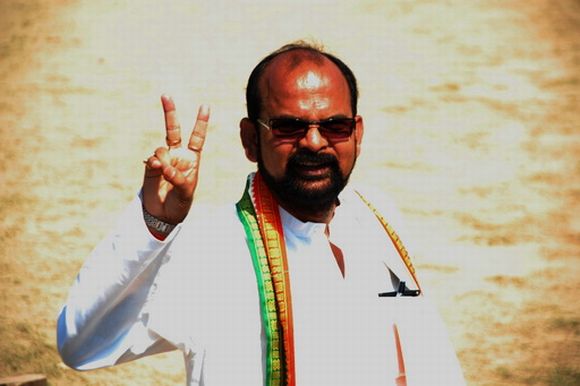
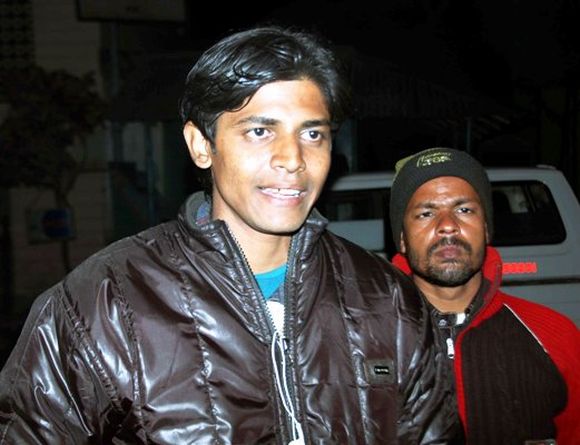
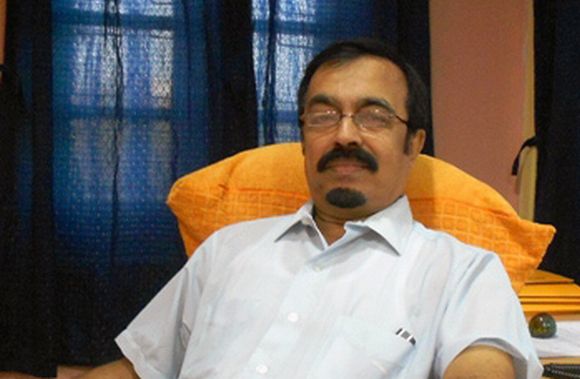
article